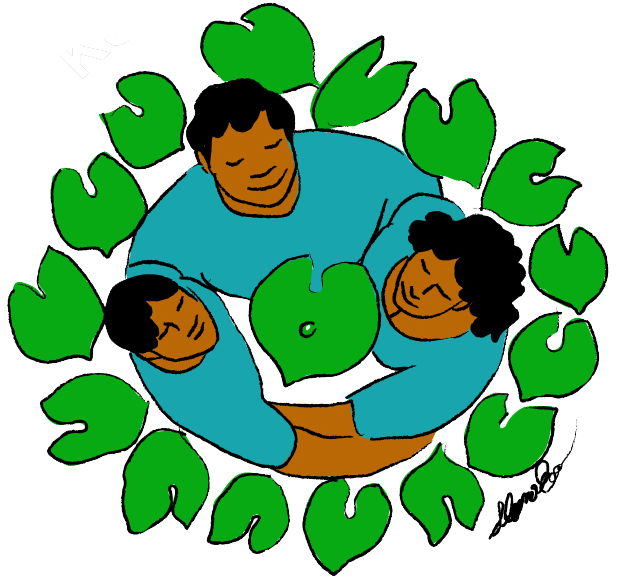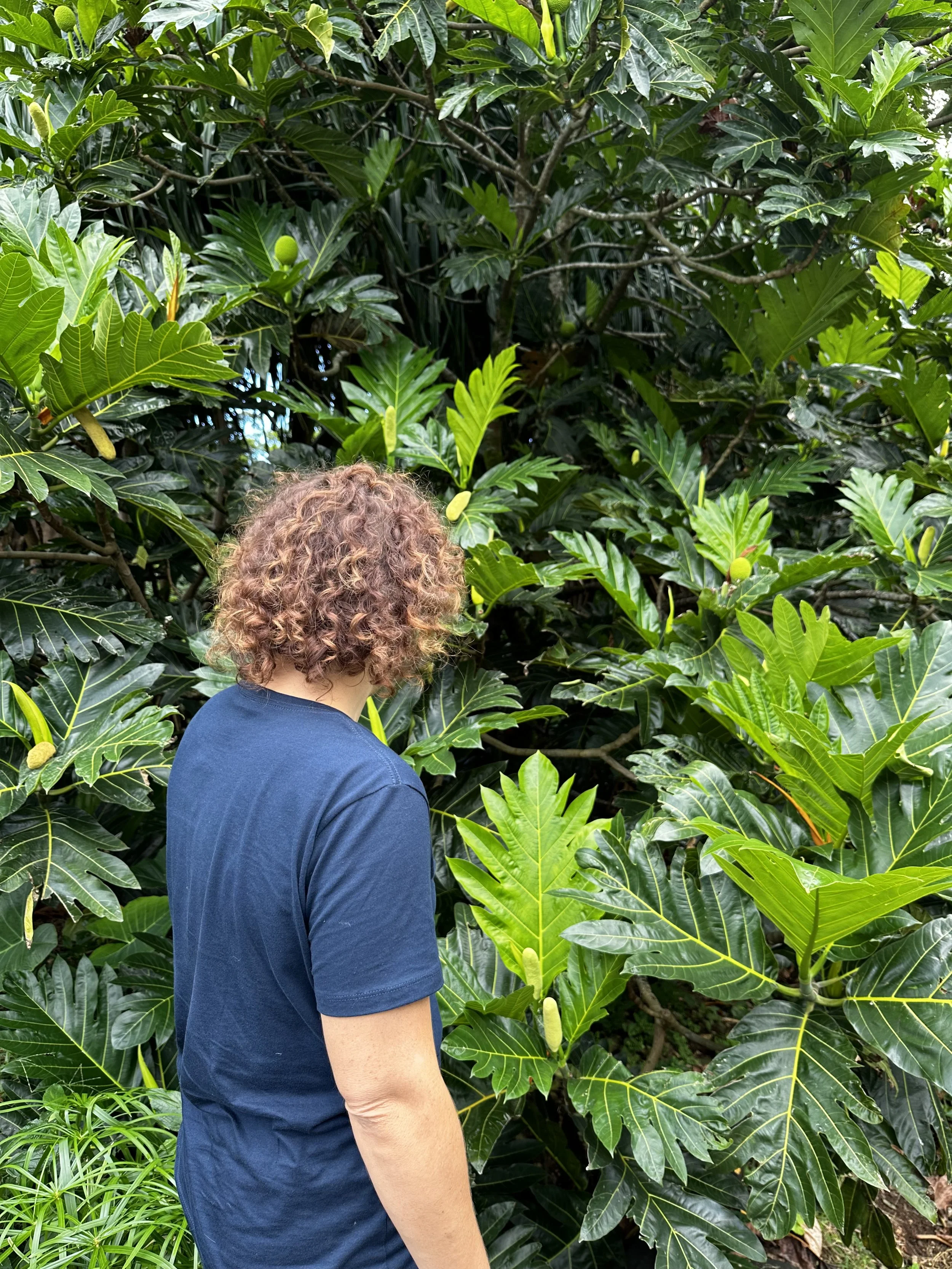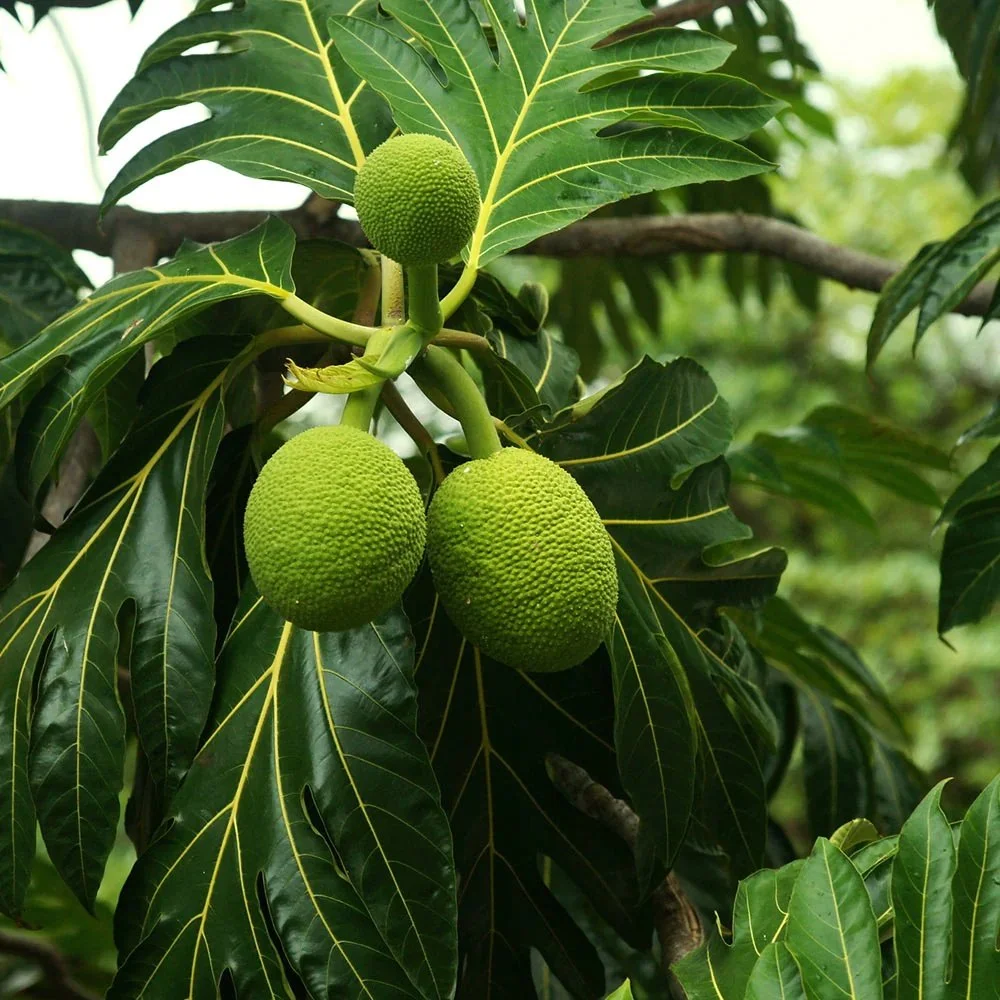The Healing Power of Food
This is the third in a series of stories where we explore what ancestral abundance looks like and ponder the question: Should access to healthy food be a human right? We’d be honored if you’d join in the conversation here and on our social media platforms (Instagram/Facebook) to uplift KKV programs, such as Healing Our Food Systems. Together we can continue connecting people to ʻāina and health. The first and second installments of our Healing Our Food Systems series are viewable on our website.
EDITOR’S NOTE: To protect the identity of the person interviewed for this article, their name has been changed to maintain confidentiality.
‘Jamie’ poses in front of an ʻulu tree. Photo courtesy of Allyson Ijima.
“It was so much more than just getting produce.” That’s how Hui Hoaka Research Assistant Allyson Ijima would describe her time working with KKV’s Healing Our Food Systems program. The program aimed to provide fresh, healthy food to Kalihi residents in need regardless of their financial status or income. Funding for the program ran out back in August, after serving the community for a year. Although the program has since shuttered, the impact that Healing Our Food Systems left on the community, the team, and other food assistance programs is lasting.
For former Kalihi resident Jamie, Healing Our Food Systems was a huge blessing for them and their family. “It was just me, my daughter, and my mom. We lived off a single income, and I’m self-employed,” explained Jamie. “Access to fresh food was not something we were used to.” They first heard about Healing Our Food Systems during the pandemic from a friend who had a connection to KKV. Jamie’s friend knew the family was struggling to put food on the table and referred Jamie to Allyson. “We really made a connection,” says Jamie. “The program genuinely cared about us.”
One of the biggest things that Healing Our Food Systems helped Jamie with was their mom’s diet and health. “My mom fought cancer twice. When it came back the second time, we were a part of the [Healing Our Food Systems] program, so we had access to healthy foods she needed to eat.” Jamie was their mom’s primary caretaker, even while they maintained their job and raised their daughter. Jamie says more than half of their household’s food came from Healing Our Food Systems, which took a huge burden off of their shoulders. One thing that really excited Jamie about the program was how fresh and locally sourced everything was. “With Healing Our Food Systems, we always got the freshest produce and even meat. There's no comparison to this stuff. My mom’s favorite was the papaya, and they were always ripe and soft enough for her to chew.” Jamie expressed gratitude for all the food they and their family ever received but reiterated the impact that the produce they received from Healing Our Food Systems had. “My mom would not have lived as long as she did without that fresh food.”
Jamie’s mom passed away in March 2023 at 97 years old. “She was a fighter,” says Jamie. Since her passing, Jamie and their daughter moved out of Kalihi, which, they say, was one of the hardest things they've ever had to do. “I was born and raised [in Kalihi], it was my home. Every morning I would wake up and ask my mom what she wanted for breakfast, but now she’s not there. It was hard to stay in that house.” However, Jamie says they felt the move allowed them to take a step back, relax, and reflect on life thus far. And they say that Healing Our Food Systems really helped with this. “I miss my mom, but now I turned that time spent with her to taking care of myself and my daughter. I have time to brush my hair now!” Although the program is no longer serving the community, Jamie explained that the stability and comfort that the fresh produce gave them, helped them to build confidence and move forward in their life. “I feel very much at peace now. The move was a blessing in disguise.”
ʻUlu in bloom. Photo courtesy of KKV Communications Team
Although the door that is Healing Our Food Systems has closed, so many other doors of opportunity have opened because of the program. Allyson has seen the program grow and shift from beginning to end. She says she has a newfound passion for food assistance, and much of her work focus has shifted to serving our community and finding new ways to support others through food. “Other KKV food assistance programs, like the one with Roots for example, is starting to shift and transform into some of the aspects that made Healing Our Food Systems so special,” she says. “We also started brainstorming ways to create more community outreach, like maybe doing pop-up events to distribute recipes so recipients can learn how to cook with the produce they’re given.” One thing that stuck with Allyson from her time with Healing Our Food Systems was the impact that it had on the community and those she worked with. “It was always more than just getting a box of produce. We were able to talk story with these people and really form a connection.” Through these connections, the Healing Our Food Systems team built trust with Kalihi community members. “When they expressed concerns or other struggles, we were able to connect them with the correct resources or providers.”
Allyson continues to search for answers to the question: “should access to healthy food be a human right?” Recently, she and Hui Hoaka Program Director Megan Inada gave a presentation for the National Association of Community Health Centers on food security and nutrition, and the services KKV offers to address our community's needs. She says it was so interesting to hear that other programs across the country with completely different demographics from Kalihi foster the same beliefs as Healing Our Food Systems. Allyson also recently traveled to New Orleans, Louisiana to learn from other food assistance programs and share what KKV is doing to serve Kalihi. While Healing Our Food Systems no longer has the resources to continue in its previous form, its approach and precedent continue to inspire our staff and even sister programs across the country.






